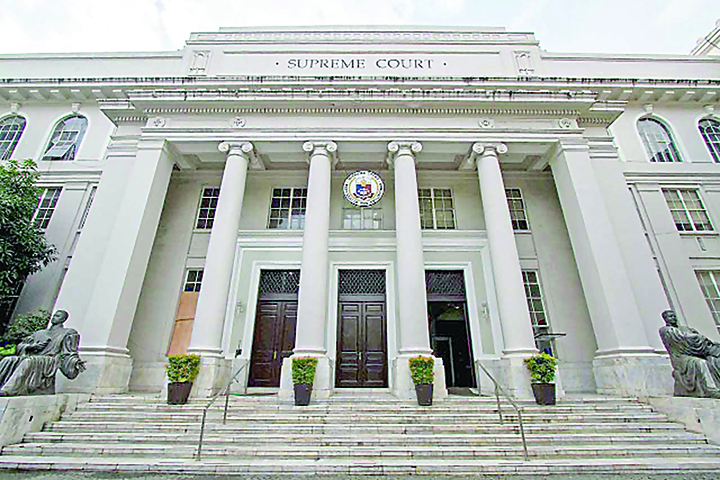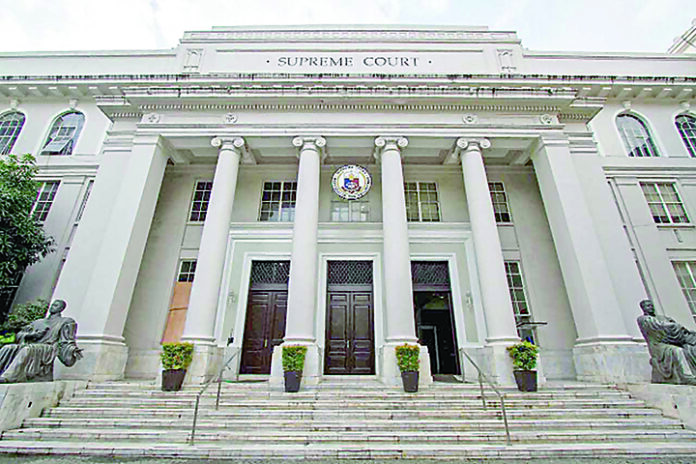
THE Supreme Court has decided to cut short the testimony of National Security Adviser Hermogenes Esperon after he linked several groups with terrorist the Communist Party of the Philippines-New People’s Army (CPP-NPA) during last week’s continuation on the oral argument on the 37 petitions assailing the constitutionality of the Anti-Terrorism Law.
At the start of the ninth and last day of the oral argument, Chief Justice Alexander Gesmundo said the Court would instead issue a resolution detailing the specific questions that the justices would like Esperon to answer.
The Chief Justice said Esperon’s response to the questions would have to be incorporated in the memorandum that would be submitted by the Office of the Solicitor within 30 days upon issuance of the resolution.
The Court made the decision following the filing of a motion by several petitioners assailing the constitutionality of ATA, seeking to expunge the testimony of Esperon and to delete from its records the controversial videos that Esperon was presented to the justices during oral arguments last Wednesday.
“With regards to motion to expunge [the] testimony, video presentation and annotations of respondent Hermogenes Esperon… the Court resolves to require respondent to comment,” CJ Gesmundo announced.
“The Court also decided not to continue the interpellation of Esperon based on the compliance that they have submitted earlier,” the chief magistrate added.
On the other hand, the CJ Gesmundo announced that Court agreed to issue a show-cause order to Free Legal Assistance Group (FLAG) lawyer and one of the counsel-petitioners Theodore Te for his statement posted in social media castigating the Court for allowing Esperon to red-tag several groups in open session last week.
During the court proceedings, Esperon played a two-minute video of self-exiled CPP founder Jose Maria Sison wherein the latter can be heard mentioning the names of 18 organizations whom the latter called “allied organizations.”
He also played a 1987 video of Sison supposedly naming the legal organizations in the supposed National Democratic Revolution.
Esperon disclosed that about 75 organizations such as the Alliance of Concerned Teachers, Anakbayan, Kilusang Mayo Uno, Bagong Alyansang Makabayan, Gabriela and several others were present in a meeting presided by Sison in Hong Kong sometime in 2020.
These groups, he said, are part of the so-called International League of People’s Struggles which meets every year.
The petitioners said Esperon should not have been allowed to testify since the SC is not a “trier of facts.”
In doing so, the petitioners said, of the Court provided Esperon the opportunity to openly red-tag progressive groups, which is one of the main issues raised in the petitions.
Amici curiae’s opposing views
Meanwhile, former Chief Justice Reynato Puno and former SC Associate Justice and ex-Solicitor General Francis Jardeleza, gave contrasting opinions on the issues raised against the ATA.
Both Puno and Jardeleza were designated by the Court as amici curiae (friends of the court) to give their impartial and expert opinion on the matter.
In his position paper submitted to the Court, Puno called on the SC to strike a balance between the protection of rights guaranteed under the Constitution and national security in resolving the 37 petitions seeking to declare the ATA of 2021 as unconstitutional.
“Your Honors, we are to seek the right balance between individual liberty and national security. This is not case of all or nothing matter but a matter of more or less,” Puno told the High Tribunal.
“The balance should not reduce individual rights into insignificance for they are inherent to human dignity. Neither should the balance put an end to the security of the people for they did not enter into a ‘suicide pact’ when they ratified the Constitution. The ideal is for us to be both free and safe,” Puno stressed.
Puno admitted that there were certain provisions in the ATA that he considers as a matter of “constitutional concern,” particularly in the process of designation of terrorists.
Among these provisions are Sections 25, 35, 36, 38 and 41 with respect to designation of terrorists and the power of the Anti-Money Laundering Council (AMLC) to order freezing of their assets.
He questioned the Anti-Terrorism Council’s automatic adoption of the list of terrorists that comes from the UN Security Council (UNSC).
Puno explained that it is not clear whether the UNSC Resolution 1375 mandatorily ordered member-states to automatically adopt its list of terrorists.
“The process followed by the UN Security Council in arriving at the list may not conform with our Constitution. We are not aware how much of the process is open and how much is in camera,” the former Chief Justice told the Court.
“The standard of fairness in the listing process should be our legitimate concern. The criteria that guided the Security Council in preparing the black list can be changed from time to time. The change may be demanded by the lay of the legal landscape, which will vary from country to country. The change in criteria may not always be in accord with our fundamental law and automatically adopting the UN list may not give us any wiggle room to avoid unconstitutional difficulties,” Puno elaborated.
Another concern raised by Puno dwells on ATC’s authority to determine the person or organization to be designated as terrorists based on a probable cause.
“The disconcerting question is whether there is a meaningful remedy on the part of a person or organization designated by ATC as a terrorist when it’s finding of probable cause rests on erroneous ground,” Puno stressed.
Puno’s concern was anchored on the lack of express provision in the ATA that allows aggrieved parties to assail the factual basis of the designation made by ATC.
With regard to the freezing of assets of designated terrorists, Puno noted that AMLC’s may issue a freeze order valid only for 20 days but may be extended for a period not exceeding six months by the Court of Appeals.
He said this was in contrast with regard to the freeze orders involving terrorists determined by the UNSC and adopted by the ATC, which is indefinite until ordered lifted.
“When a law makes distinction when there is no difference, there is a violation of the equal protection clause of the Constitution,” Puno pointed out.
Puno also raised the possibility of violation of the principle of equal protection under the Constitution with regard to the implementation of Sections 26, 27, 28 and 36 pertaining to proscription of terrorists.
He noted that the proscription is used only for terrorist organizations, associations or groups of persons and not for individual persons listed as terrorists by designation.
Furthermore, the former Chief Justice raised the possibility of violation of existing rights of arrested persons with the implementation of Section 29 of the ATC, which authorizes in writing law enforcers to take custody suspected terrorists and detain them for a period of 14 days which can be extended for a maximum of 10 more days depending on several conditions.
“Undeniably, there will be cuts on the rights of detainees under our present law. Again, the difficult constitutional question to resolve is how deep can these cuts be allowed on detainees without destroying the essence of their rights,” Puno explained.
Likewise, Puno raised some “bothersome” provisions covering surveillance of terrorists such as the continued surveillance of persons already charged with terrorism and the use of any mode to perform this act.
“This runs against the conventional thinking that when a person is charged, the State has already the quantum of evidence to convict the person beyond reasonable doubt,” Puno said.
On the other hand, Jardeleza told the magistrates that the petitions should be dismissed on the grounds of lack of legal standing and that the Court is not a trier of facts.
“While a case for ‘pre-enforcement review’ of a criminal statute is possible, the same is allowed solely on grounds of vagueness. Since none of the petitioners has sought to avail of this exception, I humbly submit that…37 petitions should be dismissed,” Jardeleza said.
He added that cases presenting factual issues, such as the alleged torture of petitioners Japer Gurung and Junior Ramos, should be tried first under the doctrine of hierarchy of courts—before the lower court first—then the Court of Appeals.
Guru and Ramos, both Aetas, were charged with non-bailable offenses of illegal possession of firearms and explosives and for violation of the provision of the ATA before the Regional Trial Court of Olongapo City last September.
Gurung and Ramos and two other female Aetas are accused of being members of the communist New People’s Army (NPA).
“Petitioners cannot short-circuit this process by simply invoking the ‘transcendental or paramount’ importance of their case,” he explained.
While the issues raised by petitioners against the ATA are important as it involves civil liberties, Jardeleza admitted that the facts presented by petitioners are insufficient for the Court to rule against the ATA.
“My point: Judges of the RTC and justices of the Court of Appeals are not only equipped to receive and ascertain the facts for this Court, they also, in their own right, make constitutional law,” the former magistrate said.
“I think it is time we start hearing from them by giving them the first crack at cases such as these,” he added.
Jardeleza also indicated that the observance of the doctrine of hierarchy of courts is necessary in order to unclog the Court’s docket and hasten the resolution of cases.
He noted that based on the Judiciary Annual Report of 2916, the Court has a total case load of 14,491 as of December 31, 2016; 14,411 cases in 2017; 15,339 cases in 2018 and 14,760 cases in 2019.
Despite efforts to introduce reforms by three former chief justices, namely, Teresita de Castro, Lucas Bersamin and Diosdado Peralta to unclog the Court’s docket, the number of pending cases from 2016 to 2019 also remained at the same level.
Thus, Jardeleza proposed that the Court consider imposing strict work or page limits to petitions filed before it and declaring that the 24-month period mandated by the Constitution to decide a case is mandatory and should be dutifully observed across all levels of the courts.
At the end of the oral argument, CJ Gesmundo said the Court has decided to require the petitioners to submit their memorandum on the basis of the clustering based on the issues they agreed to present in the oral argument.
He said a resolution would be issued setting forth the contents of the memorandum and would give the parties 30 days within which to submit their memoranda.
Read full article on BusinessMirror



